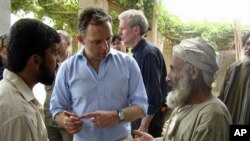A comment by NATO's Ambassador to Afghanistan, Briton Mark Sedwill, that Kabul is safer for children than New York or London has angered children's aid organizations which say Afghanistan is one of the worst places on the planet to be a child.
Ambassador Mark Sedwill was talking to a BBC News program aimed at children in an interview he did in the Afghan capital several weeks ago.
"Here in Kabul and in the other big cities actually there are very few of those bombs and children are probably safer here than they would be in London or New York or Glasgow or many other cities," he said.
But when the comments were aired publicly Monday they caused an uproar in the aid community. The head of Save the Children called the comments misleading or wrong. Sarah Crowe is South Asia spokeswoman for the United Nations Childrens agency, UNICEF.
"UNICEF continues to regard Afghanistan as being one of the most dangerous countries in the world to be a child," she says.
Afghanistan also has the highest infant and maternal mortality rates in the world, says Crowe.
"Out of every five children, one child dies before enjoying his or her fifth birthday. And every mother that dies of course represents a tragedy for the child and the family left behind."
She says there have been some improvements since the United States led an invasion nine years ago.
"In the year 2001, there were no girls officially in school. Today we have two and a half million girls in school, so there is without any doubt real progress, but it's slow and it's extremely complex trying to make the lives of children better in a situation of extreme conflict," says Crowe.
NATO's Sedwill issued a statement clarifying his remarks, saying he was trying to point out that violence was prevalent in only a minority of places around Afghanistan and that in cities like Kabul, the total levels of violence are comparable to those western children would experience. Crowe says there has been a 55 percent increase in child casualties in Afghanistan this year compared to 2009.
"If you take education, yes things have progressed on that front, but if you take the sort of general safety and well being of children, there have not, things have not progressed on that front. There's a lot of work to be done," she adds.
The NATO ambassador's statement says the biggest challenges for Afghans stem from poverty. Crowe confirms that 40 percent of Afghans do live in poverty, but says the biggest obstacle to progress in Afghanistan is the deteriorating security situation.
Children Safe in Kabul, Says NATO Ambassador; Aid Groups Disagree




